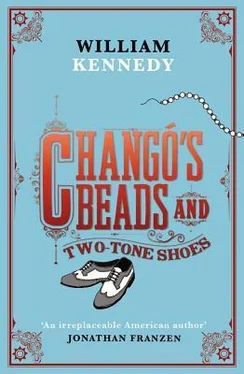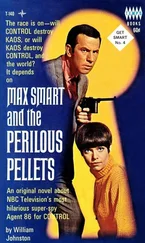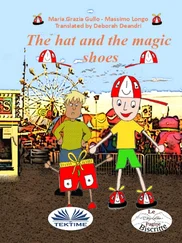“Nonsense,” Quinn said. “He’ll be good to talk to. He’s already sorry about Cooney. There’s a whole lot more to him than you saw at the bar.”
“I dislike him.”
“You said that. Try again.”
“I have no reason to try.”
“How about his link to Santeria? He gave his Nobel medal to the Virgen del Cobre — in Santiago.”
“He gave the medal to la Virgen ? Why?”
“He didn’t trust Batista and his thieves, so he gave it to the Cuban people through their patron saint.”
A great and ancient ceiba tree spreading itself magnificently at the front entrance welcomed Quinn and Renata to the Finca, and a middle-aged Cuban woman opened the door and said el señor was on the porch. She walked them toward Hemingway, who was sitting in a wooden Adirondack chair, wearing a long sport shirt, shorts, sandals, and making notes on a pad. He stood up.
“Mr. Quinn. Señorita Suárez. I’m sorry I frightened you the other night.”
“You didn’t frighten me,” Renata said.
“I upset you.”
“You were cruel to Mr. Cooney.”
“I wasn’t in my best form. I apologize.”
“You should apologize to Mr. Cooney.”
“Did you go to your dog’s funeral?” Quinn asked.
“I was the funeral,” Hemingway said.
“An old dog?”
“Not so old, still full of hell. Black Dog. One of Batista’s goons bashed in his head with a rifle butt. They were chasing a rebel they thought had guns hidden near my pool. Black Dog didn’t like the soldiers and bit one on the thigh, going for the money. Smartest damn dog in the western hemisphere and he’s dead, a casualty of the revolution. Let’s go inside.”
He led them to the living room and gestured them to the sofa, then sat in an overstuffed armchair. The room had full bookcases on every wall and two hunting trophies, the mounted heads of a black-horned gazelle and a seven-point red deer. Rum, gin, bourbon and scotch bottles clustered on a table by his chair. “Too early to drink,” he said, “and my doctor won’t let me have a goddamn thing.”
“I thought I detected you drinking daiquiris the other night.”
“I was on shore leave.”
“Did the soldiers find those guns by your pool?” Renata asked.
“I hope not.”
“Do you know the rebels?”
“I fish with them.”
“Are they with the Twenty-sixth?”
“I wouldn’t ask them that question.”
“I ask because I had friends killed in the Palace attack,” Renata said.
“So did I,” said Hemingway.
“We were at the Montmartre last night,” Quinn said. “Ten minutes after we left they killed an army colonel at the casino, Fermín Quesada.”
“You people know where the action is.”
“We’re heading for Oriente,” Quinn said. “Climb the hills and see Fidel. I know your friend Matthews just did that, but Fidel is worth another interview, don’t you think? Batista’s people kill him every day in the papers.”
“Batista’s finished. Those Directorio kids at the Palace proved that. When fifty or sixty of the best young people in the country give up their lives to kill you, you’re all done. Can you get to Fidel?”
“I’m working on it.”
“You have to get past the army and their barricades. They’re mean sonsabitches.”
“There’s an army press conference tomorrow in La Plata. I’m going.”
“You ever cover a war?”
“The cold war in Germany, Fourth Division, your old outfit.”
“Did they teach you how to climb mountains in a tropical rain forest when you’re dodging hostile fire?”
“I missed that lecture. I’ll have to wing it. I was writing sports for the Division weekly. But my grandfather came down here to find Céspedes during the Mambí war and wrote a book about it. He called it Going to Meet the Hero . Ever hear of it?”
“I read hundreds of books for a war anthology I edited, and I remember some Americans wrote well about Cuba back then. What was his name?”
“Daniel Quinn.”
“Ah. Recycling family history.”
“Why not? He covered the Civil War for the Herald , and rode with the Fenians when they invaded Canada. He got around. But his book on going to see Céspedes got to me. He walked the swamps, the jungle, and the mountains in Oriente, and he got to his man. The Spaniards starved him in jail and he damn near died, but he got out and wrote the story and then wrote the book.”
“Now you’re looking for jail time.”
“I was in a saloon in Greenwich Village with a friend of mine who thinks his fame is just around the corner, either as a writer or an artist. He pointed to a Lindbergh poster behind the bar and said, ‘Quinn, when are you making your solo to Paris?’ I told him, ‘I’ve got a train ticket to Albany.’ Actually I took a job in Miami, and then Havana was just a short hop.”
“Is your friend famous yet?”
“He’s still in the saloon, monitoring Lindbergh.”
Hemingway smiled, but somberly. He breathed deeply, then again, and his torso seemed to deflate. That exuberance and assurance, so in evidence at the Floridita, was missing.
“Were you writing your Paris book when we barged in?”
“Twenty-six words today,” he said. “Twenty-six.”
“It’s only noon,” Quinn said.
“I got up at six. I should be fishing by now, but I can’t do that either.”
“Here’s something that’ll cheer you up,” Quinn said, and he handed him Cooney’s letter.
Hemingway put on his glasses and Quinn and Renata watched him read. He finished, took off the glasses and squinted at Quinn.
“The Baltimore thrush is a throwback, and I’m a bum. It’s a publicity stunt. What’s this stuff about medals?”
“He was a Marine. He got a Silver Star in the Pacific.”
“Silver Star. We should never underestimate thrushes.”
“Cooney blames you for his friend’s death. He said his head injury from that left hook was why they were still in their hotel room when the soldiers shot at them.”
“Screw that, every inch of it,” Hemingway said, and his exuberance was back. He sat upright and his face tightened. “Am I supposed to get weepy over these tourists who don’t know when to duck? A duel? How about five rounds bareknuckle?”
“Bareknuckle. Are you serious?”
“How do you get serious about the Cooneys of this world?”
“I’m not sure, but he says he’s going public with this.”
“And you’re writing about it.”
“Only if you take him up on it.”
“I couldn’t win a duel with him, even if I killed him.”
“You’ve been challenged to a duel before?”
“Half my life. Cooney says I’m a coward. I spent years facing that one down. But the question is, Doctor Hemingstein, are you afraid to face down a Marine war hero? It’s the cliché of the western. ’Hey, Wild Bill, they say you’re a fast draw. Go for your gun.’ If I back out I was always yellow and I only shoot guns to get it up. I’m very brave when I shoot unarmed ducks. But the truth is everybody’s yellow till they get over it. They’re going to shoot you or shell you or bomb you, so you organize your coward maneuvers and you go AWOL the night before battle, or you run the other way when they start shooting, or you shoot yourself in the foot and they send you on sick call. You know how to get rid of a yellow streak? Stop thinking about what’s next. Think about right now and that you aren’t dead and probably won’t be. You got your weapon. They’re not shooting at you this minute and if they start they may not hit you. If they hit you you’re dead. But who gives a goddamn at that point? Not you. You’re dead. Fuck it. Fuck death. It’s just another goddamn thing you can’t do anything about. Have a drink, climb a tree, shoot a duck, fuck somebody. Don’t worry about it. You’re dead or you’re not, and either way it’s not up to you. Stroke your weapon.”
Читать дальше












